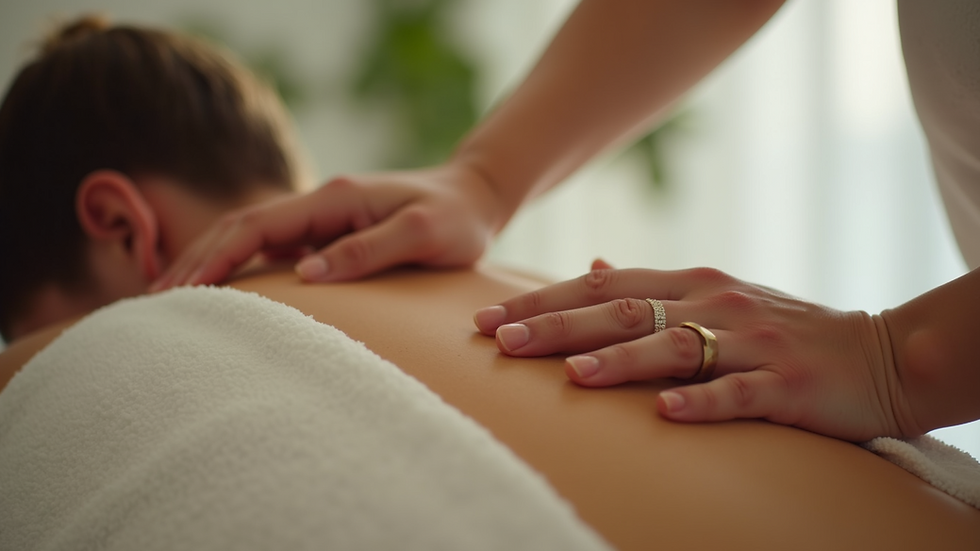Why Traditional Practices Are Key to Modern Wellbeing
- Shaba Thaimassage

- Jun 2, 2025
- 4 min read
In our fast-paced, technology-driven world, many people are searching for methods to improve their mental, emotional, and physical health. Interestingly, the answer often lies in looking back to our roots. Traditional practices have a lot to offer in terms of enhancing modern wellbeing through techniques that have been refined over generations. This post will dive into how embracing these age-old practices can make a significant difference in our contemporary lives.
Understanding Traditional Practices
Traditional practices encompass a wide range of cultural and historical methods from various societies that have been used for centuries. These can include herbal medicine, meditation, yoga, dance, rituals, and various forms of physical exercise. By reconnecting with these practices, we tap into holistic approaches that provide both preventive healthcare and healing.
Unlike conventional medicine, which may often focus on treating symptoms, traditional practices aim to balance the body, mind, and spirit. This integrative approach is increasingly recognized for its relevance in our modern lives, particularly as stress and mental health issues become more prevalent.

Approximately 80% of the world’s population relies on herbal medicine as their primary source of healthcare, according to the World Health Organization.
The Benefits of Traditional Practices
Traditional practices offer numerous benefits for modern wellbeing. Here are some key highlights:
1. Stress Reduction
Many traditional practices, such as yoga and meditation, focus specifically on relaxation and stress reduction. For example, studies have shown that meditation can lower levels of the stress hormone cortisol. Not only does this help in managing immediate stress but it also plays a role in sustaining emotional wellbeing long-term.

Creating a tranquil space for meditation can lead to enhanced mental clarity and emotional stability.
2. Physical Health Improvement
Physical activities rooted in traditional practices—like Tai Chi or Qigong—promote balance, flexibility, and strength. These exercises have been proven to aid in the prevention of chronic diseases. For instance, a study published in the Journal of Preventive Medicine confirmed that regular Tai Chi practice reduces falls and enhances cardiovascular health in older adults.
Additionally, many of these practices can be easily adapted to suit individual needs, making them accessible for people of all ages.
3. Connection to Community and Culture
Engaging in traditional practices fosters a sense of community and belonging. Activities like traditional dance or communal cooking not only promote physical health but also strengthen social ties, which are essential for mental wellbeing. Research shows that strong social connections can lead to a longer life and lower rates of anxiety and depression.
Moreover, embracing and practicing our cultural traditions can help maintain a sense of identity and continuity that feels increasingly necessary in a globalized world.
4. Enhanced Emotional Resilience
Traditional practices often encourage mindfulness, self-reflection, and emotional regulation. Techniques like journaling and storytelling, which are prominent in various cultures, allow individuals to process their feelings and experiences. Studies have indicated that expressive writing, for example, can lift mood and reduce stress.
The arts, including music and dance, also serve as powerful tools for emotional expression, helping individuals to connect with their feelings and even heal from trauma.

Traditional dances often provide an emotional outlet and cultural expression for communities around the world.
Integrating Traditional Practices into Modern Life
As modern life can be overwhelming, integrating traditional practices need not be complicated. Here are some actionable steps to foster a healthier lifestyle with the help of these age-old methods:
1. Start Small
You don’t need to overhaul your entire lifestyle at once. Start with small steps. For instance, begin each day with a five-minute meditation or a short yoga session. Apps and online classes make it easy to access guidance, even for beginners.
2. Explore Herbal Remedies
Research and educate yourself on herbal remedies that are suitable for your health needs. Always consult healthcare professionals before starting any new treatment. For example, herbs like chamomile can be beneficial for relaxation, while turmeric is known for its anti-inflammatory properties.
3. Engage with Community
Get involved with community groups that focus on traditional practices, such as cooking classes or dance workshops. Not only will you learn something new, but you will also meet others who share your interest in these enriching practices.
4. Create a Routine
Regularly incorporating traditional practices into your daily routine can lead to more significant long-term benefits. Whether it’s practicing yoga, preparing a traditional meal, or participating in a group activity, consistency is key to experiencing positive outcomes.
5. Mindful Technology Usage
Though technology may often seem at odds with traditional practices, we can use it to our advantage. Online platforms provide access to resources, communities, and classes that encourage traditional practices. However, mindful usage is essential—ensure that technology complements rather than detracts from your wellbeing journey.
The Sustainable Future of Traditional Practices
The world is slowly realizing the value of traditional practices in fostering health and wellness. Various organizations and private entities are beginning to integrate these methods into their offerings, acknowledging their importance. Holistic wellness centers, like shaba thai, embrace these practices to cater to individuals looking to enhance their mental and physical health.
With rising interest, it's vital to preserve and respect the cultural origins of these practices. Global cooperation to honor traditional knowledge can help ensure these holistic approaches endure for future generations, fostering a more balanced approach to health and wellbeing.
Nourishing the Body, Mind, and Spirit
Incorporating traditional practices into our lives can have profound effects on our overall health and wellbeing. As we navigate through an age of speed and efficiency, taking the time to embrace methods that promote balance and holistic health is not just beneficial—it's essential.
Whether you explore stress-relief techniques from various cultures, engage in community activities, or simply adopt a more mindful lifestyle, the journey of integrating traditional practices is one well worth taking. Ultimately, it's about enhancing your quality of life and finding that vital connection to self, others, and the world around you.




Comments